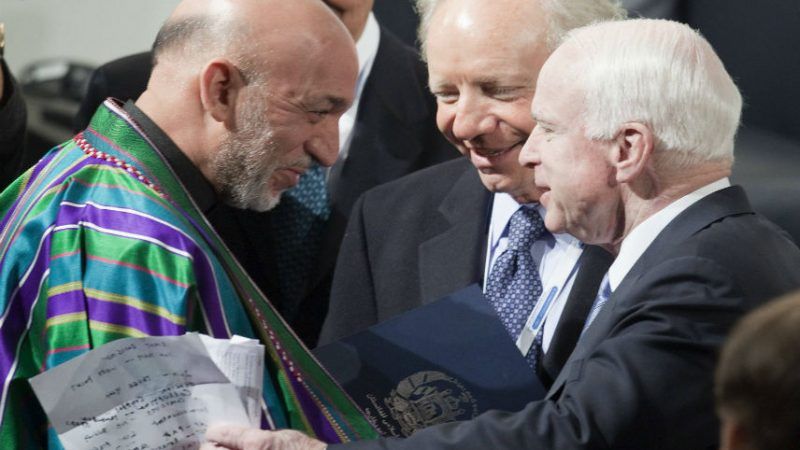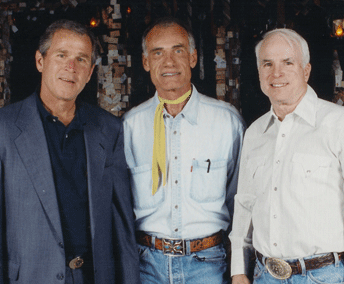Will McCain-Style Conservatism Live On?
In the Arizona senator's waning days, it's an open question whether his familiar vision of a robustly interventionist America idealistically leading the international trading order will survive in Donald Trump's GOP.


What is it about the red Sonoran dust that produces Arizona senators who punch so far above their national weight?
Barry Goldwater, an Arizonan from before there was a state, thrilled a generation of conservatives with his libertarian-inflected ideas, yanked the Republican Party westward from its Northeast base, read the riot act to Richard Nixon as impeachment loomed and paved the way for Ronald Reagan. So compelling a figure was he that some of the same Democrats who vilified Goldwater as a half-mad nuclear warmonger during his disastrous 1964 presidential run, bathed him in respect at the end of his long public career.
Goldwater's successor, Arizona Republican Sen. John McCain, has lived a rich enough life that he's cycled a few times through periods of public affection, derision and rapprochement. And while people don't use the moniker "McCain conservative" the way they do "Goldwaterite," that doesn't mean his conception of what a Republican and even a centrist should be hasn't been profoundly influential, particularly over the past quarter-century.
McCain has been a constant fixture in the headlines, from when he was shot down over Hanoi in 1967 to today, as he prepares for his own funeral. He is arguably Washington's most pivotal nonpresident since the end of the Cold War. His vision of a robustly U.S.-led international order of free trade, human rights and patriotic idealism is familiar enough. The question is, will that type of conservatism live on?
Interventionism has been central to the McCain project. Both the senator and the nation graduated from a hesitant "peace dividend" posture (albeit with the occasional missile strike) early in the 1990s to preemptive war-machine status by the decade's end, aiming to liberate captive peoples with the world's most potent military. McCain went from criticizing President Clinton's first-term interventions in Somalia, Haiti and Yugoslavia to shouting down his own party's isolationist flank in support of Clinton's second-term bombing of Kosovo.
Critical to this transformation was his own—and, again, the nation's—healing of Vietnam wounds. McCain overcame 5½ years of often brutal captivity, which left his body permanently damaged. He went on to team with his fellow senator and Vietnam vet, Democrat John F. Kerry, to hold POW hearings on Capitol Hill and normalize relations with still-communist Vietnam.
In his 1998 memoir "Faith of My Fathers," McCain shook off what we used to call the Vietnam Syndrome at the book's conclusion. "Surely, for a time, our loss in Vietnam afflicted America with a kind of identity crisis," he wrote. "[But] we should never have let this one mistake, terrible though it was, color our perceptions forever of our country's purpose."
Ironically, McCain's emerging celebrity as he wrote those words distracted observers from just how interventionist his foreign policy views had become. While he rode the "Straight Talk Express," charming the national press corps during his first joyous "maverick" run for the Republican presidential nomination, the candidate's ideology went largely unexamined. In fact, he championed a doctrine of "rogue state rollback," offering aid to those who would "overthrow the odious regimes" in countries such as Iraq and North Korea, and vowing never to "abandon them to the mercies of tyrants whenever they meet with reversals."
His aggressive vision lost in the 2000 nomination battle to George W. Bush, who promised a more humble foreign policy. But McCain won the longer-term war of ideas once Bush was faced with the horrors of 9/11. The senator's credibility with Democrats and journalists initially helped convince fence-sitters to back Bush's eventually disastrous Iraq war.
Domestically, McCain has mostly been the opposite of the libertarian Goldwater (which helps explain the frosty relationship that persisted between the two), championing intrusive federal interventions in everything from political advertising to athletes' use of performance-enhancing drugs. When the financial crisis hit during the last weeks of the his second presidential race, in 2008, he was long on gestures—showily suspending his campaign—but short on coherent ideas.
McCain's conservatism has rarely been populist. His father and grandfather were celebrated Navy admirals, his mother and second wife were heiresses, and his private sector career lasted all of 18 months. He kept the conservative grassroots at arm's length, except when he felt threatened enough to pander to them. (See his 2010 campaign ad, "Complete the danged fence.")
Still, in most pursuits, and through his waning days, the senator has imbued his actions and words with a haughty yet self-effacing sense of patriotism and honor, most clearly on display these days with his repudiation of the "half-baked, spurious nationalism" of President Trump's politics.
All the same, it's hard to escape the conclusion that McCain and his Republican cohort—Sen. Bob Corker, former Gov. Jeb Bush, Sen. Marco Rubio, Gov. John Kasich, Sen. Lindsay Graham—helped midwife the conservative politics they now so clearly loathe. The twin follies of promiscuous war and unbridled GOP growth of government, lashed to sporadic and transparently insincere nods toward populism, has turned a generation of voters against the Republican establishment. It remains to be seen if the rejection will be permanent.
Goldwater conservatism has mostly been chased off—fellow Arizonan Jeff Flake, arguably the most Goldwaterite member of the Senate, is quitting rather than fighting the Trump wave. If McCain conservatism is going to last longer than its namesake, it will have to confront the errors that made Trump possible.
Matt Welch is author of McCain: The Myth of a Maverick. This article originally appeared in the Los Angeles Times.


Show Comments (162)